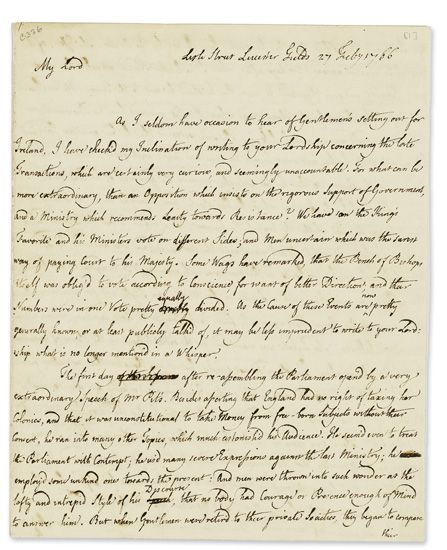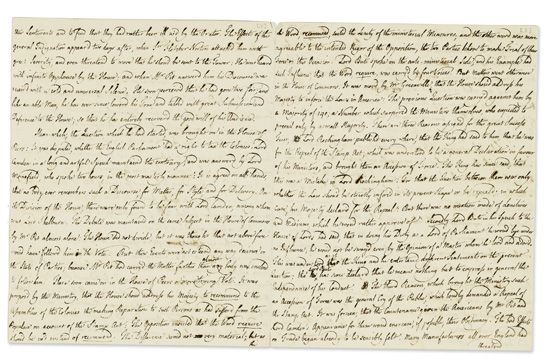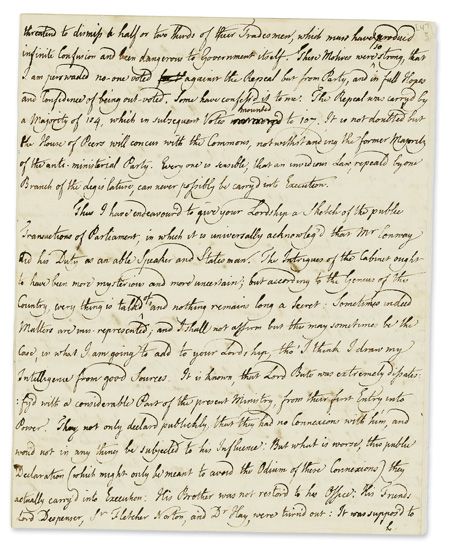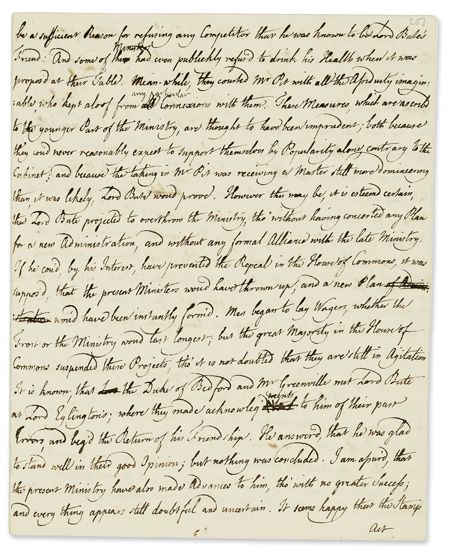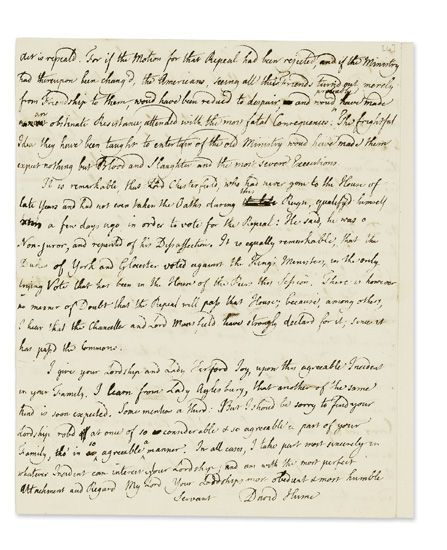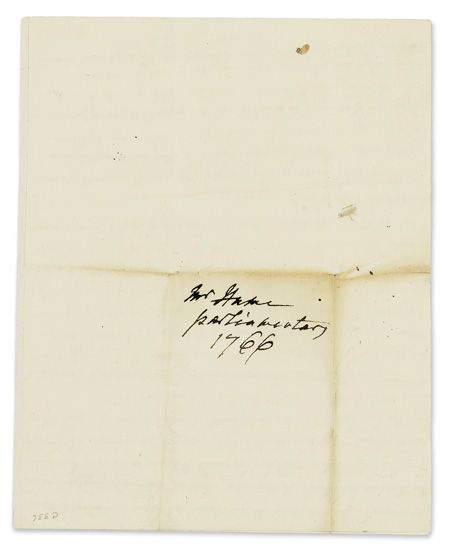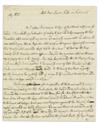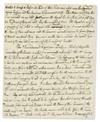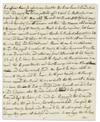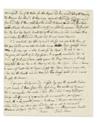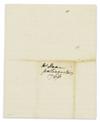Sale 2276 - Lot 33
Price Realized: $ 40,000
Price Realized: $ 48,000
?Final Price Realized includes Buyer’s Premium added to Hammer Price
Estimate: $ 25,000 - $ 35,000
STAMP ACT'S PARLIAMENTARY UPHEAVAL HUME, DAVID. Autograph Letter Signed, to the Ambassador of Great Britain to France the Earl of Hertford ("My Lord"), recounting William Pitt's speech before the House of Commons defending the American reaction to the Stamp Act, touching on that House's response to the speech, describing the dispute in the House of Peers concerning whether the Parliament has a right to tax the colonies, and whether the House should demand of the colonies that reparations be paid for damages, describing the influence upon the vote to repeal the Stamp Act of rumors that the King favored repeal, repeating a rumor that the lack of opposition to the repeal was partly due to Lord Bute's having plotted to overthrow the Ministry, and offering his own opinion favoring repeal. 6 pages, 4to, written on two folded sheets; reinforced along each vertical fold. "Lisle Street, Leicester Fields," 27 February 1766
Additional Details
". . . [T]he Parliament opened by a very extraordinary speech of Mr. Pit's [William Pitt]. Besides asserting that England had no right to her Colonies, and that it was unconstitutional to take money from free-born subjects without their consent, he . . . much astonished his audience. He seemed even to treat the Parliament with contempt; . . . and men were thrown into such wonder at the lofty and intrepid style of his discourse, that nobody had courage or presence enough of mind to answer him. . . .
"Meanwhile the question which he had started, was brought on in the House of Peers; it was disputed, whether the English Parliament had a right to tax the colonies. . . . Mr. Pit had carry'd the matter farther than almost anybody was inclined to follow him. . . . It was moved by Mr. Grenville that the house should address his Majesty to inforce the laws in America. The . . . question was carried against him by a majority of 140; a number which surprised the Ministers themselves . . . . Lord Rockingham published everywhere that the King had said to him that he was for the repeal of the Stamp Act . . . . The King has since said, that this was a mistake . . . . It was foreseen, that the countenance given the Americans by Mr. Pit and Lord Camden's appearance for them would increase, if possible, their obstinacy. The bad effects on trade began already to be sensibly felt. Many manufacturers all over England had threatened to dismiss a half or two-thirds of their tradesmen, which must have produced infinite confusion . . . . I am persuaded no one voted against the repeal but from party and in full hopes and confidence of being out-voted. . . ."
Hume (1711-1776) was a Scottish historian and philosopher who served in 1765 and 1766 on the staff of the British Embassy in Paris.
This letter has been described as "a long, minute, and singularly graphic account of the transactions of Parliament on its first day of its assembling that year"--William Knight, Hume, page 89. Published in Grieg, Letters of David Hume, 2:18-23. Provenance: Sotheby's John Young sale, 26 April 1869, lot 500; Alfred Morrison catalogue, 1897; Parke-Bernet sale, 26 November 1941, lot 269.
"Meanwhile the question which he had started, was brought on in the House of Peers; it was disputed, whether the English Parliament had a right to tax the colonies. . . . Mr. Pit had carry'd the matter farther than almost anybody was inclined to follow him. . . . It was moved by Mr. Grenville that the house should address his Majesty to inforce the laws in America. The . . . question was carried against him by a majority of 140; a number which surprised the Ministers themselves . . . . Lord Rockingham published everywhere that the King had said to him that he was for the repeal of the Stamp Act . . . . The King has since said, that this was a mistake . . . . It was foreseen, that the countenance given the Americans by Mr. Pit and Lord Camden's appearance for them would increase, if possible, their obstinacy. The bad effects on trade began already to be sensibly felt. Many manufacturers all over England had threatened to dismiss a half or two-thirds of their tradesmen, which must have produced infinite confusion . . . . I am persuaded no one voted against the repeal but from party and in full hopes and confidence of being out-voted. . . ."
Hume (1711-1776) was a Scottish historian and philosopher who served in 1765 and 1766 on the staff of the British Embassy in Paris.
This letter has been described as "a long, minute, and singularly graphic account of the transactions of Parliament on its first day of its assembling that year"--William Knight, Hume, page 89. Published in Grieg, Letters of David Hume, 2:18-23. Provenance: Sotheby's John Young sale, 26 April 1869, lot 500; Alfred Morrison catalogue, 1897; Parke-Bernet sale, 26 November 1941, lot 269.
Exhibition Hours
Exhibition Hours
Aliquam vulputate ornare congue. Vestibulum maximus, libero in placerat faucibus, risus nisl molestie massa, ut maximus metus lectus vel lorem.



